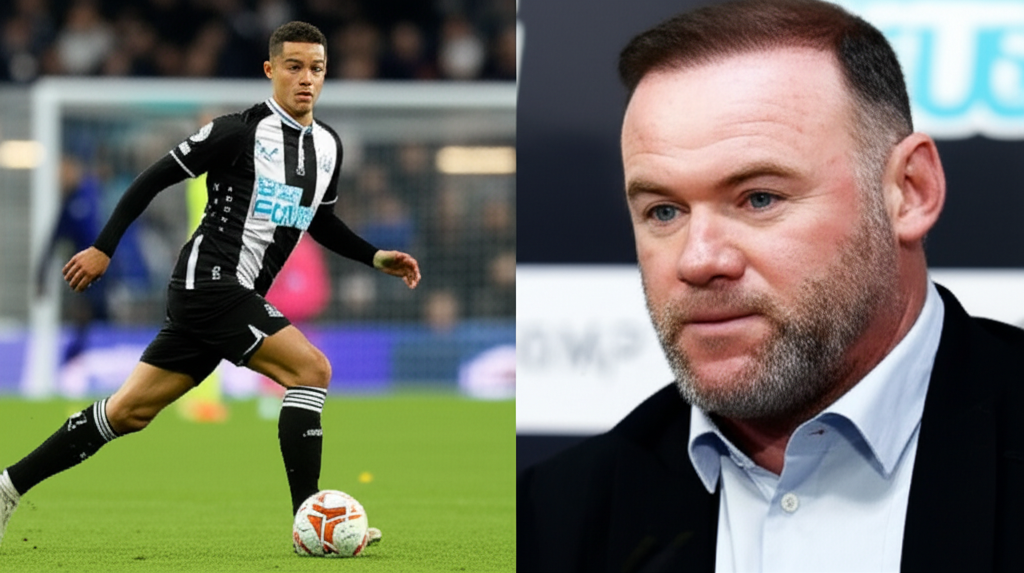Rooney’s Stance on Isak Signals Shifting Player Loyalty in Football’s Modern Era
Legend’s comments on potential transfer create talking points about player-club relationships
Manchester United icon Wayne Rooney has ignited a debate within football circles with his recent candid remarks about striker Alexander Isak’s hypothetical transfer situation. Rooney, speaking in his capacity as a respected figure in the sport, stated that he would not welcome Isak back to Newcastle United if the player were to actively seek a move to a rival club, specifically mentioning Liverpool. This strong opinion from a former captain and record goalscorer for Manchester United touches upon a sensitive subject: the evolving nature of player loyalty and the dynamics between athletes, clubs, and fans in the modern game.
Rooney’s Direct Assessment of Isak’s Alleged Intentions
The core of Rooney’s statement, as reported by The Mirror, revolves around a hypothetical scenario where Isak might have attempted to engineer a move to Liverpool. While the article doesn’t present definitive proof of such an attempt, Rooney’s commentary implies he perceives a potential for disloyalty from the Newcastle forward. Rooney’s perspective, shared publicly, suggests a belief that a player showing a desire to leave for a direct competitor, particularly one with a history of intense rivalry, would forfeit their standing with the current club’s fanbase. This viewpoint is rooted in a footballing ethos that often emphasizes commitment and unwavering dedication to the club badge.
Echoes of Ferguson’s Approach to Player Conduct
The article draws a parallel between Rooney’s current stance and the managerial philosophy of Sir Alex Ferguson, Rooney’s former mentor at Manchester United. It suggests that Ferguson, known for his stringent control and uncompromising standards, might have similarly viewed such player actions. The phrase “looked the other way” in the source title implies that Ferguson, while perhaps not overtly punishing, would have recognized and acted upon any perceived breach of loyalty, often prioritizing the collective over individual desires. Rooney’s comments can be interpreted as an endorsement of this hardline approach, emphasizing that actions perceived as undermining the club’s stability or ambition would have significant consequences for a player’s reputation and future within the club.
The Modern Player Transfer Market: Ambition vs. Allegiance
Rooney’s outspokenness highlights a recurring tension in contemporary football. Top players often aspire to compete at the highest level, which frequently involves moving to clubs with a stronger recent track record of winning major trophies or playing in the most prestigious competitions. This ambition can sometimes clash with the loyalty expected by clubs and their supporters, especially when a transfer request is perceived as driven by personal gain or a disregard for the current team’s project. Newcastle United, having recently re-established itself as a significant force in the Premier League, is a prime example of a club investing heavily in its squad with aspirations of sustained success. Any player seen to be agitating for a move away, particularly to a direct rival, would likely face considerable scrutiny from the St. James’ Park faithful.
Divergent Views on Player Autonomy and Club Obligation
While Rooney’s perspective resonates with fans who value traditional notions of loyalty, it is important to acknowledge that the modern football landscape also emphasizes player rights and career management. Players, like any professionals, have a right to pursue opportunities that they believe will best serve their careers. From this viewpoint, an attempt to move to a more historically successful or financially powerful club, even a rival, could be seen as a rational career decision rather than an act of disloyalty. Football agents and player representatives often advise their clients to consider all avenues for advancement, leading to situations where player aspirations and club expectations diverge. The debate, therefore, is not simply about loyalty, but also about the balance of power between clubs and their highly valued athletes in a globalized market.
Implications for Club Management and Fan Relations
The comments made by Rooney serve as a reminder to club management and fanbases about the delicate relationship between players and supporters. Clubs invest significant resources in acquiring and developing talent, while fans invest emotional capital and financial support. When these investments appear threatened by a player’s perceived disloyalty, it can lead to significant friction. For clubs like Newcastle, looking to build a stable and successful future, managing player expectations and ensuring alignment with the club’s long-term vision is crucial. Rooney’s frankness could be interpreted as a cautionary tale for any player considering actions that might alienate the fanbase or disrupt team cohesion.
Key Takeaways for Football Enthusiasts
- Wayne Rooney’s comments on Alexander Isak reflect a traditional view of player loyalty.
- The debate touches upon the modern footballer’s career aspirations versus club expectations.
- Rooney’s opinion aligns with an era where managerial authority, exemplified by Sir Alex Ferguson, was paramount.
- Modern player contracts and market dynamics grant players more agency in their career choices.
- Clubs face the challenge of balancing player ambition with maintaining fan goodwill and team stability.
Rooney’s strong opinion on the hypothetical Isak transfer situation underscores a persistent discussion about what constitutes loyalty in professional football. While past eras might have emphasized unwavering commitment to a single club, the current reality involves a more fluid player market where personal ambition and career advancement play significant roles. How clubs and fans navigate these competing interests will continue to shape the narrative of player-club relationships in the years to come.
References:


























